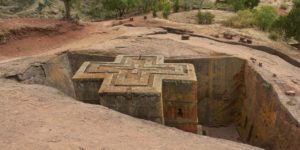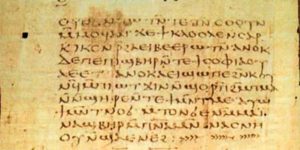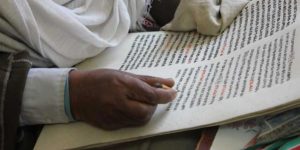Judaic Worship and Music at Ethiopia’s Christian Festival’s
When we travel to Ethiopia on the various festival dates, you will be able to see the cloth-covered “Ark of the Covenant” (replica) paraded through town by a troupe of chanting priests along with replica’s of the tablets (tabot) on their heads. They hold silk umbrellas which are symbols of heaven, swinging incense burners, beating drums and clapping sistras (cymbal-like instruments), these modern priests recall the ancient Israelites described in the Bible: 1 Chronicles 15:16 David told the leaders of the Levites to appoint their fellow Levites as musicians to make a joyful sound with musical instruments: lyres, harps and cymbals. It really is spectacular. People walk, barefooted from all over to worship together. There is much to learn about Ethiopia’s historical worship music and dance. The picture is of the beautiful museum in Aksum (Axum) that can be used for private teachings for Bible study, music or culture.
Not only is there worship and music from the First Temple time period, but even Ethiopian Christians follow dietary rules that are similar to Jewish Kashrut, specifically with regard to how an animal is slaughtered. Similarly, pork is prohibited, though unlike Rabbinical Kashrut, Ethiopian cuisine does mix dairy products with meat- which in turn makes it even closer to Jewish oral Torah. Women are prohibited from entering the church at specific times; they are also expected to cover their hair with a large scarf (or shash) while in church, but contrary to the teaching of most other Christian denominations, it is not from instructions from the Old Testament that this is taken, but rather in the New (1 Cor. 11). As with Orthodox synagogues, men and women are seated separately in the Ethiopian church, with men on the left and women on the right (when facing the altar). Ethiopian Orthodox worshippers remove their shoes when entering a church, in accordance with Exodus 3:5 (in which Moses, while viewing the burning bush, is commanded to remove his shoes while standing on holy ground). Furthermore, both the Sabbath (Saturday), and the Lord’s Day (Sunday) are observed as holy, although more emphasis, because of the Resurrection of Christ, is laid upon the Holy Sunday. Initially, the areas of Ethiopia had a pre-Abrahamic culture then a Hebraic culture and now very much a Judeo-Christian culture. Join us for Meskel (Finding of the True Cross, Timket (Epiphany, Ledet (Christmas), Fasika (Easter) or even the Feast of Saint Aregawi at Debra Damo.
Living Passages is offering a new & unique educational Creation tour through South Africa!



